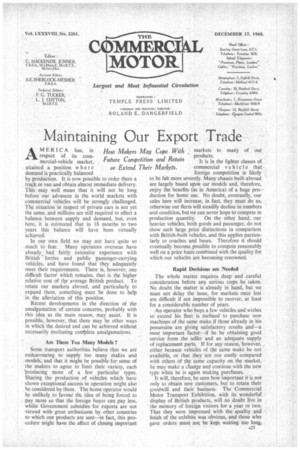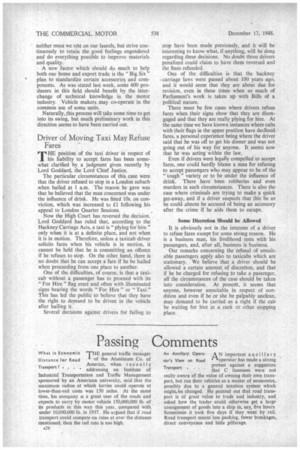Maintaining Our Export Trade
Page 27

Page 28

If you've noticed an error in this article please click here to report it so we can fix it.
AMERICA has, in respect of its commercial-vehicle market, attained a position where demand is practically balanced by production. It is now possible to order there a truck or van and obtain almost immediate delivery. This may well mean that it will not be long before our advances in the world markets with commercial vehicles will be strongly challenged. The situation in respect of private cars is not yet the same, and millions are still required to effect a balance between supply and demand, but, even here, it is estimated that in 18 months to 'two years this balance will have been virtually achieved.
In our own field we may not have quite so much to fear. Many operators overseas have already, had fairly extensive experience with British lorries and public passenger-carrying vehicles, and have found that they adequately meet their requirements. There is, however, one difficult factor which remains, that is the higher relative cost of the average British product. To retain our markets abroad, and particularly to expand them, something must be done to help in the alleviation Of this position.
Recent developments in the direction of the amalgamation of certain concerns, probably with this idea as the main reason, may assist. It is possible, however, that there may be other ways in which thedesired end can be achieved without necessarily instituting confplete amalgamations.
Are There Too Many Models ?
Some transport authorities believe that we are endeavouring to supply too many makes and models, and that it might be possible for some of the makers to agree to limit their variety, each -producing more of a few particular types. Sharing the production of vehicles which have shown exceptional success in operation might also be considered by them. The home operator would be unlikely to favour thc idea of being forced to pay more so that the foreign buyer can pay less, whilst Government subsidies for exports are not viewed with great enthusiasm by other countries to which our products are sent—in fact, this procedure might have the effect of closing important markets to many of our products.
It is in the lighter classes of commercial vehicle that foreign competition is likely to be felt more severely. Many chassis built abroad are largely based upon car models and, therefore, enjoy the benefits (as in America) of a huge pro-' duction for home use. No doubt, eventually, our sales here will increase, in fact, they must do so, otherwise our fleets will steadily decline in numbers .and condition, but we can never hope to compete in production quantity. On the other hand, our heavier vehicles, both goods and passenger, do not show such large price distinctions in comparison with British-built vehicles, and this applies particularly to coaches and buses. Therefore it should eventually become possible to compete reasonably well on a price basis combined with the quality for which our vehicles are becoming renowned.
Rapid Decisions are Needed The whole matter requires deep and careful consideration before any. serious steps be taken. No doubt the matter is already in hand, but we must not delay the issue, for markets once lost are difficult if not impossible to recover, at least for a considerable number of years.
An operator who buys a few vehicles and wishes to extend his fleet is inclined to purchase new machines of the same make if those already in his possession are giving satisfactory results and—a most important factor—if he be obtaining good service from the seller and an adequate supply of replacement parts. If for any reason, however, either because vehicles of the same make be not available, or that they are too costly compared with others of the same capacity on the market, he may make a change and continue with the new type when he is again making purchases. It will, therefore, be seen how important it is not only to obtain new customers, but to retain their goodwill and their business. The Commercial Motor Transport Exhibition, with its wonderful display of British products, will no doubt live in the memory of foreign visitors for a year or two. That they were impressed with the quality and finish of the exhibits was obvious, and those who gave orders must not be kept waiting too long, neither must we rest on our laurels, but strive continuously to retain the good feelings engendered and do everything possible to improve materials and quality.
A new factor which should do much to help both our home and export trade is the "Big. Six" plan to standardize certain accessories and components. As was stated last week, some 600 producers in this field should benefit by the interchange of technical knowredge in the motor industry. Vehicle makers may co-operate in the common use of some units.
Naturally, this process will take some time to get into its swing, but much preliminary work in this direction seems to have been carried out.
Driver of Moving Taxi May Refuse Fares
Pr HE position of the taxi driver in respect of his liability to accept fares has been somewhat clarified by a judgment given recently by Lord Goddard, the Lord Chief Justice.
The particular circumstances of this case were that the driver refused to stop in a London suburb when hailed at 1 a.m. The reason he gave was that he believed that the man concerned was under the influence of drink. He was fined 10s. on conviction, which was increased to £ [following his appeal to London Quarter Sessions.
Now the High Court has reversed the decision. Lord Goddard has ruled that, according to the Hackney Carriage Acts, a taxi is "plying for. hire" only when it is at a definite place, and not when it is in motion. Therefore, unless a taxicab driver solicits fares when his vehicle is in motion, it cannot be held that he is committing an offence if he refuses to stop. On the other hand, there is no doubt that he can accept a fare if he be hailed when proceeding from one place to another.
One of the difficulties, of course, is that a taxicab without a passenger has to proceed with its "For Hire" flag erect and often with illuminated signs bearing the words "For Hire" or "Taxi." This has led the public to believe that they have the right to demand to be driven in the vehicle after hailing it.
Several decisions against driver's for failing to stop have been made previously, and it will be interesting to know what, if anything, will be done regarding these decisions. No doubt those drivers penalized could claim to have them reversed and the fines refunded.
One of the difficulties is that the hackney carriage laws were passed about 100 years ago, and it would seem that they are about due for revision, even in these times when so much of Parliament's work is taken up with Bills of a political nature.
There must be few cases where drivers refuse fares when their signs show that they are disengaged and that they are really plying for hire. At the same time we have known instances where cabs with their flags in the upper position have declined fares, a personal experience being where the driver said that he was off to get his dinner and was not going out of his way for anyone. It seems now that he was acting 1,vithin the law.
Even if drivers were legally compelled to accept fares, one could hardly blame a man for refusing to accept passengers who may appear to be of the " tough " variety or to be under the influence of drink. There have been robberies and even murders in such circumstances. There is also the case where criminals are trying to make a quick get-away, and if a driver suspects that this be so he could almost be accused of being an accessory after the crime if be aids them to escape.
Some Discretion Should be Allowed It is obviously not in the interests of a driver to refuse fares except for some strong reason. He is a business man, his livelihood rests with his passengers, and, after all, business is business.
Our remarks concerning the refusal of unsuitable passengers apply also to taxicabs which are stationary. We believe that a driver should be allowed a certain amount of discretion, and that if he be charged for refusing to take a passenger, all the circumstances of the case should be taken into consideration. At present, it seems that anyone, however unsuitable in respect of condition and even if he or she be palpably unclean. may demand to be carried as a tight if the cab be waiting for hire at a rank or other stopping place.




























































































